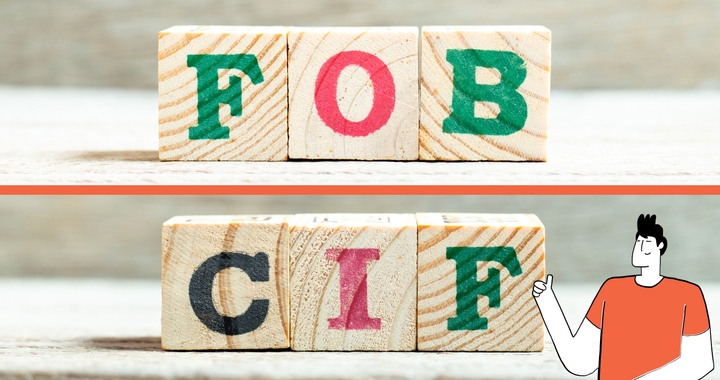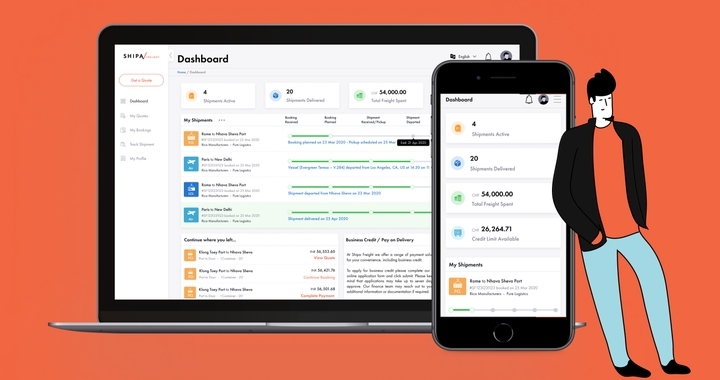What is the difference between FOB and CIF?


Whether you’re selling or buying goods, understanding the different types of shipping contracts—like FOB and CIF—will help you better understand your responsibilities throughout a transaction. This in turn will help you reduce risk and lead to a smoother supply chain. So what is the difference between FOB and CIF? And how does it affect the import and export process?
“Free on board” (FOB) and “cost, insurance, and freight” (CIF) are two important rules governing domestic and international trade. These contracts determine ownership and liability from the port of origin to the destination. FOB and CIF are both Incoterms—rules for cargo transport that the International Chamber of Commerce maintains. Incoterms determine each party’s duties and dictate the transfer of ownership during a transaction.
It is vital that companies shipping or receiving goods internationally understand the important implications FOB and CIF have on shipping costs and risks.
FOB: Giving control to the buyer

TheFOB Incoterm places most of the responsibility for shipping on the buyer. The seller hands off the goods to the buyer’s carrier service at the port. Once the goods cross the ship’s rail onto the deck, the supplier’s arrangements have ended.
All further responsibilities for freight logistics and unloading belong to the buyer. After the seller delivers the goods onto the vessel at the port of origin, the buyer’s chosen carrier transports the goods to the destination.
Buyer responsibilities
In FOB, the buyer is responsible for the following:
- Paying the freight costs
- Paying import duties and clearing customs
- Unloading at the destination
When shipping FOB, the seller does not have to pay import duties or manage customs documents for import.
Types of FOB terms
While FOB makes the buyer responsible for most shipping arrangements after the port of origin, the party that bears the risk for the goods depends on the specific type of FOB terms. There are two types of FOB contracts that determine ownership and liability for products in international shipments.
FOB destination
In FOB destination terms, the seller or exporter remains responsible for the safety of the cargo while it is in transport. Due to this liability, a seller might wish to purchase insurance on the goods. This is similar to CIF terms; however, CIF carries added costs and insurance requirements for the seller.
FOB origin
In FOB origin (also known as FOB shipping point), the supplier officially completes the sale by transferring the cargo to its shipping carrier. The buyer becomes responsible for all liability as soon as the goods reach the carrier at the port of origin.
Insurance for FOB
Neither FOB destination nor FOB origin requires the seller or the buyer to provide freight insurance. However, insurance helps reduce the cost of potential damages or losses during water transport.
When shipping FOB destination, the seller should consider purchasing insurance to cover potential losses. When shipping FOB origin, the buyer should consider purchasing insurance for their goods during shipping.
Whether you choose destination or origin depends on the specifics of the transaction and the risk you’re willing to accept. A third-party logistics provider like Shipa Freight offers a range of supply chain solutions to manage origin facilities, forecast freight costs, and optimize transportation.
CIF: Giving control to the seller

The CIF Incoterm places the responsibility for paying most shipping expenses on the seller.
Responsibilities for CIF
When shipping with CIF terms, the seller holds responsibility for the following:
- Shipping the goods to the destination port
- Paying the freight costs
- Paying for cargo insurance
Under a CIF contract, the buyer chooses the port where the seller must deliver the goods. The seller pays for all freight expenses to deliver the shipment to that port. Because the seller must manage the freight and delivery, CIF terms always include a port of destination.
Insurance for CIF
CIF is one of only two Incoterms that mandate that one party (the seller) provides cargo insurance throughout the shipment’s journey to its port of destination.
Choosing between FOB and CIF

Companies buying and selling internationally should weigh the benefits of FOB versus CIF before choosing either option. For your company, the right choice comes down to the specific circumstances of the transaction, your shipping experience, and your preference for responsibility.
duties|FOB destination|FOB origin|CIF| |------- | ---------------- | ---------------- |----------: Arranges freight and loading|Buyer|Buyer|Seller Bears liability for goods in transport|Seller|Buyer|Seller
When to choose FOB over CIF
Buying FOB requires the buyer to bear much more responsibility for the shipping and delivery of the cargo. However, this can be an advantage. Because FOB transfers the freight responsibility to the buyer, the buyer has an opportunity to search for better freight rates. If you’re purchasing goods, you’ll be able to choose your preferred (and trusted) freight forwarder.
As a buyer, you could also have better access to tracking information for the shipment using FOB. For example, Shipa Freight offers companies access to real-time data through a supply chain control tower. Finally, by choosing a trusted logistics partner, you can gain better support for your FOB shipments.
When to choose CIF over FOB
New buyers or importers sometimes choose CIF when purchasing international goods because it reduces the need for logistics management on their end. Since the seller handles loading and freight, the buyer simply has to arrange pickup. This can be an optimal arrangement for inexperienced importers who aren’t yet familiar with international shipping.
However, this usually also leads to higher costs for the buyer because the exporter can choose shipping rates. For example, the seller might increase their margins on the products to cover the costs.
Generally, it’s wise to choose FOB if you’re buying international goods because you can potentially secure lower shipping rates. But if you’re selling goods internationally, choose CIF so that you can select a freight forwarding partner and adjust margins to ensure you make a profit.
Understanding your options for FOB and CIF

Both FOB and CIF cover waterway transportation. Primarily, these Incoterms apply to international ocean freight, but they also cover importing and exporting via inland waterways.
When you’re shipping bulk freight via sea freight carriers, FOB and CIF dictate ownership and responsibility at each port and in between. And when you export goods, these Incoterms determine if you or the buyer are responsible for managing customs documents.
When companies are shipping containerized cargo, CIF terms might not be ideal. Companies often deliver shipping containers days before the carrier loads them onto the ship. Therefore, the seller remains at risk while the containers are out of their hands and waiting for loading.
The FOB and CIF Incoterms only cover shipping via ocean and inland waterways and do not apply to air freight. However, there is an Incoterm for air freight that is similar to CIF. “Carriage and insurance paid” (CIP) covers air freight and requires the seller to pay for insurance. The seller’s insurance is valid until the goods reach their destination.
Weighing FOB and CIF for your next shipment

The FOB and CIF Incoterms are important rules that you must consider when participating in international trade. What is the difference between FOB and CIF? Answering that question will help you ensure a smooth transaction and achieve cost-effective shipping logistics.
Learn how dedicated freight forwarding partner Shipa Freight can tailor an international logistics solution to your company’s needs.
Why Ship With Shipa Freight?

Shipa Freight can assist you in making your shipment easy and hassle-free. We have access to the best freight forwarding platforms that can greatly benefit your shipping experience.
Shipa Freight has expert staff and the latest logistics technology to help you with your shipment needs. With our expertise, we can guarantee seamless and hassle-free shipping for you. We also provide you with assistance in choosing Incoterms so that you can get your cargo faster and without complications.
If you need to ship cargo, choose Shipa Freight for easy and stress-free shipping.


